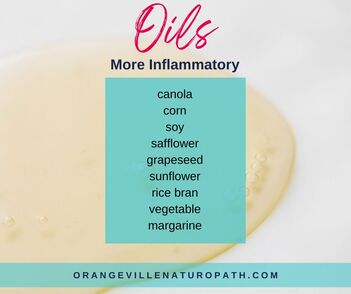We need fats for:
- fat soluble vitamin absorption (A, E, D, K)
- the nervous system, including the brain
- hormone production
- cell membranes
- energy storage
- cushioning our organs
- chemical reactions that signal: growth, immune function, inflammation
Inflammation
Even though we talk about inflammation like it's a bad thing, keep in mind that we actually require inflammation in order to heal. If you bump your knee or fight an infection, these are all short term inflammatory processes essential to repairing and defending our bodies. Inflammation becomes problematic when it is chronic, as in the case of cardiovascular disease, high blood pressure, metabolic syndromes, stress, diabetes, and many conditions ending in "-itis" (e.g. arthritis, colitis). The inflammation continues because the factors that allowed these conditions to develop have offset the healing response.
Interestingly, the oils we consume can make a profound impact on chronic inflammation in the body. Historically, our foods used to have a balance between omega-3s and omega-6s, and while both are essential fatty acids, North American diets have become dominant in pro-inflammatory omega-6s, mostly thanks to our manufacturing and production practices. Disrupting the ratio of fats that we consume increases the tendency towards inflammation.
Seed oils, in particular, have a high amount of PUFAs (polyunsaturated fatty acids), which promote not just inflammation but also storage of toxins in fat tissue. Yes, we put things like chemicals in our fat cells. The more inflammatory oils are: canola, corn, soy, safflower, grapeseed, sunflower, rice bran, vegetable, and margarine.
The processing and source of the oils can make a difference too. Consider how were the animals raised, how was the oil extracted, was anything added to the oil, or how much is the oil being heated in both manufacturing and cooking? Of course, it can can complicated in a hurry, just do your best ;)
Once you start reading labels, you will notice that unfortunately many "health foods" actually contain these pro-inflammatory oils: crackers, chips, bread, dressings, and sauces, could all be sources - particularly sunflower oil, I'm finding. Restaurants will use them too, but especially fast food... totally fine if this is an occasional meal, not so much if it's a daily reliance.
Anti-Inflammatory Oils
Consuming fewer inflammatory oils has been shown to reduce inflammation markers like c-reactive protein, interleukin-6, and tumor necrosis factor. (If you've had recent bloodwork with me, we've probably discussed your c-reactive protein level.)
These are oils like: butter, olive oil, ghee, coconut oil, avocado oil, MCT, and duck fat. Check the labels to make sure they are 100% and not diluted with other oils. Sometimes we push this ratio along by supplementing with omega-3 fatty acids like fish oil.
How to ensure anti-inflammatory oil consumption?
- cook at home more often
- make your own salad dressing (recipes below)
- eat less processed and packaged food, even the stuff in the "health section"
- read labels
- consider how animals were raised or crops were grown
I have seen many chronic conditions respond well to switching up the oils in food. Anything that relies on fats can improve, like better quality hormone production, nervous system communication, cell membranes, skin, less pain, better digestion, fewer cravings, absorption of fat soluble vitamins, efficient waste product elimination (through bile), immune function, faster healing, and many more.
Consequently, eating anti-inflammatory oils more often can help eczema, acne, arthritis, swelling, cardiovascular disease, diabetes, autoimmune conditions, depression, concentration, and painful periods, to name a few.
The days of fats bring the enemy are LONG gone. We need them.
Try switching up your oils and see if you notice a change: less puffiness, brighter skin, not so stiff and creaky in the morning, better mood ... and let me know!
Here are some recipes to help you out:
- Italian Dressing
- Ginger Lime Tahini Dressing
- Coconut Ranch Dressing
- 3/4 cup oil + 1/4 cup vinegar + sea salt and/or herbs
Take good care,
Dr. Christa


 RSS Feed
RSS Feed